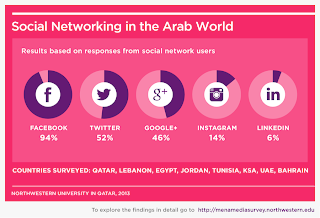It all started with Tunisia, where the Arab spring rose and generated international following using the social media platform. International people and agencies were on a watch, and kept their eyes wide open for latest updates. The latest updates on news and the Arab spring came strictly using the social media platform. The more thorough they studied the Arabs world access news and information, the more the rate of the credibility of information source.
Harris interactive has conducted one-on-one interviews with an estimated 10,000 Adults, ranging from 18 and above. Media based questions were the main topic on interest, from blogging to online banking and gaming – with heavy use of digital platform such as the internet.
An American based university in Qatar, by the name of Northwestern University, has conducted a research and posted that the ratios of positive input was at a much higher level than the negative ones.
With Tunisia and Egypt overthrowing there dictatorship regimes in 2011 with the use of social media and blogging sites. Television reminds the most important source of news and information in all the MENA regions with the exception of Bahrain and Qatar. Qatar uses more than 2 million cell phones in a country that has a population of less than 2 million. Qatari people also have a whopping 35% usage of tablets than any other country surveyed according to the CIA factbook. Internet reliance is the lowest in Egypt after conducting a research on the internet penetration level and the illiteracy in the country.
In the next picture we can see the level of perceived reliability of TV, internet and the Newspaper:
Amongst all the people surveyed in the countries where the revolution has occurred. Egypt and Tunisia, the outlook is bleak for all media with the exception of Television. With countries like Bahrain, Qatar and Lebanon relying on TV and giving faith in reading the newspaper as a credible source. UAE, in the other hand received high reliability ratings from all regional and western outlets and enterprises. Even though the local news is strictly government-owned, all respondents still favored these sources and considered them reliable sources of information.
It’s become cliché, hearing that the Arab unsprings has been ignited by social media, but that does not make it less of a fact. Social Media has been a powerful force in Arab countries.
From all the Arab countries that have been surveyed, Tunisians and Bahrainis rate amongst the highest in the MENA region, averaging to about more than 4 hours daily of social media use and engagement.
Most of the Arab regions use the internet of upto 90% in each of their respective countries. UAE coming in with the highest rate of usage regarding the wirelesshandhelds.
Facebookremains the highest and most popular social network in the Arab countries surveyed with 95% users are active on the network. With just about 45% using twitter and Google+, with 1 out of every 7 using instagram.
When it comes to online freedom of expression, the Arab countries favored that fact.





